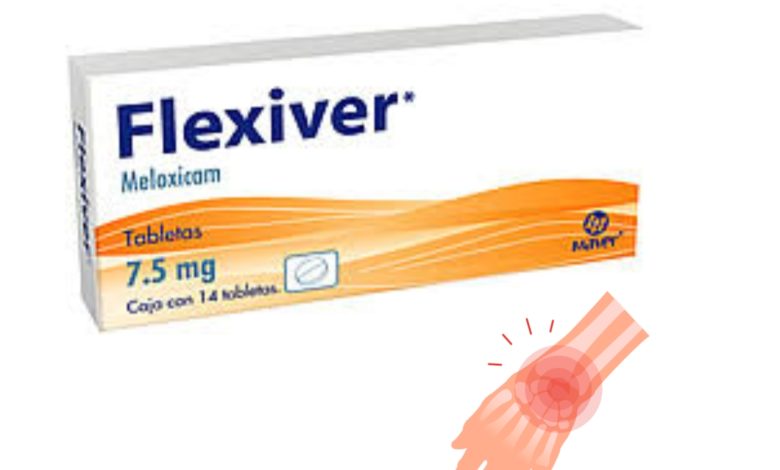Flexiver: Uses, Dosage, Side Effects, Interactions, FAQs

What is Flexiver?
Flexiver is a Mexican brand of meloxicam manufactured by MAVER, S.A. DE C.V. Flexiver is classified as a generic prescription medication, meaning it offers a cost-effective alternative to brand-name counterparts while maintaining comparable efficacy and safety standards.
Flexiver is used in the treatment of various forms of arthritis, encompassing osteoarthritis (OA), rheumatoid arthritis (RA). These conditions, characterized by inflammation and degeneration of joint tissues, inflict considerable discomfort and impair mobility, significantly impacting the quality of life for affected individuals.
For adults grappling with the debilitating effects of osteoarthritis, Flexiver emerges as a vital tool in alleviating pain and managing symptoms associated with this degenerative joint disorder. Osteoarthritis, often termed as the wear-and-tear arthritis, entails the gradual breakdown of cartilage in joints, leading to pain, stiffness, and reduced range of motion. By targeting inflammation and mitigating discomfort, Flexiver empowers individuals to regain mobility and enhance their overall well-being.
Similarly, Flexiver extends its therapeutic reach to encompass rheumatoid arthritis, an autoimmune condition characterized by chronic inflammation of the joints. By modulating the inflammatory response underlying this condition, Flexiver aids in controlling symptoms and preventing disease progression, thereby fostering improved joint function and minimizing long-term complications.
What is Flexiver’s dosage?
Your doctor will recommend the dosage of Flexiver that’s right for you. Below are commonly used dosages, but always take the dosage your doctor prescribes.
Form and strengths (7.5 mg and 15 mg)
Flexiver comes as tablets that you swallow. They’re available in two strengths: 7.5 milligrams (mg) and 15 mg.
Recommended dosages
You’ll take Flexiver once per day. Below you’ll find the usual dosages for each condition Flexiver is used to treat, including maximum dose.
Dosage for osteoarthritis or rheumatoid arthritis
For treating osteoarthritis (OA) or rheumatoid arthritis (RA) in adults, Flexiver’s recommended dosage is 7.5 mg taken once per day.
If this dose doesn’t relieve your symptoms of OA or RA, your doctor may increase your dose to 15 mg once per day. This is the maximum dose recommended for the drug.
What should be done in case of overdose?
Do not take more Flexiver than your doctor prescribes. Taking more than this can lead to serious side effects.
Symptoms of overdose
Symptoms caused by an overdose can include:
• drowsiness or sleepiness
• nausea and vomiting
• pain in the upper belly
• bleeding in the stomach or intestines
• sudden kidney failure
• coma
What to do in case you take too much Flexiver
Call your doctor if you think you’ve taken too much Flexiver. You can also call 800-222-1222 to reach the American Association of Poison Control Centers or use its online resource. But if you have severe symptoms, immediately call 911 or your local emergency number. Or go to the nearest emergency room.
Flexiver and pregnancy
It isn’t safe to take Flexiver at week 30 of pregnancy and beyond. Like other NSAIDs, Flexiver can cause harm to a fetus if taken at this point in pregnancy. It isn’t clear whether it’s safe to take Flexiver during other periods of pregnancy.
Flexiver and breastfeeding
It’s not clear whether Flexiver causes side effects in a breastfed child. The drug is known to pass into breast milk in small amounts. If you’re breastfeeding or planning to do so, talk with your doctor about the risks and benefits of taking Flexiver during this time.
Questions about Flexiver’s dosage
Below are some common questions about Flexiver’s dosage.
What if I miss a dose of Flexiver?
If you miss a dose of Flexiver, take it as soon as you remember. But if it’s the next day and nearly time for your next dose, skip the missed dose. Take your next dose at its regularly scheduled time. You should not take more than one dose of Flexiver at a time.
Will I need to take Flexiver long term?
Maybe. Your doctor will recommend taking Flexiver at the lowest dose for the shortest time needed to treat your symptoms. Some people will need to take Flexiver long term to treat their symptoms.
How long does Flexiver take to work?
Flexiver begins working shortly after you take a dose. But it may take longer before you notice any symptom relief.
What are Flexiver’s side effects?
Like most drugs, Flexiver may cause mild or serious side effects. The lists below describe some of the more common side effects that Flexiver may cause. These lists don’t include all possible side effects.
Keep in mind that side effects of a drug can depend on:
• your age
• other health conditions you have
• other medications you take
Your doctor or pharmacist can tell you more about the potential side effects of Flexiver. They can also suggest ways to help reduce side effects.
Mild side effects
Here’s a list of some of the mild side effects that Flexiver can cause. To learn about other mild side effects, talk with your doctor or pharmacist, or read Flexiver’s prescribing information.
Mild side effects of Flexiver that have been reported include:
• diarrhea
• fluid retention (buildup of fluid in the body) and bloating
• headache
• indigestion (upset stomach)
• nausea
• pain in your belly
• skin rash
• sore throat
• upper respiratory infection, such as the common cold
• mild allergic reaction*
Mild side effects of many drugs may go away within a few days to a couple of weeks. But if they become bothersome, talk with your doctor or pharmacist.
Serious side effects
Serious side effects from meloxicam can occur, but they aren’t common. If you have serious side effects from Flexiver, call your doctor right away. But if you think you’re having a medical emergency, you should call 911 or your local emergency number.
Serious side effects of Flexiver that have been reported include:
• high level of potassium in the blood
• kidney damage
• liver damage
• new or worsened high blood pressure
• boxed warnings: risk of heart problems and risk of digestive system problems*
• serious skin reactions†
• severe allergic reaction†
Allergic Reaction
Some people may have an allergic reaction to Flexiver.
Symptoms of a mild allergic reaction can include:
• skin rash
• itchiness
• flushing (temporary warmth, redness, or deepening of skin color)
A more severe allergic reaction is rare but possible. Symptoms of a severe allergic reaction can include swelling under your skin, usually in your eyelids, lips, hands, or feet. They can also include swelling of your tongue, mouth, or throat, which can cause trouble breathing.
In addition, severe skin reactions such as Stevens-Johnson syndrome (SJS) and toxic epidermal necrolysis (TEN) have been reported with Flexiver. These specific allergic reactions are life threatening and require immediately treatment. Symptoms of SJS and TEN can include:
• skin rash that blisters and peels
• fever
• body aches
• red or stinging eyes
• generally feeling unwell
• sore throat
• headache
Call your doctor right away if you have an allergic reaction to Flexiver. But if you think you’re having a medical emergency, call 911 or your local emergency number.
Interactions
Taking a medication with certain vaccines, foods, and other things can affect how the medication works. These effects are called interactions.
Before taking Flexiver, be sure to tell your doctor about all medications you take (including prescription and over-the-counter drugs). Also describe any vitamins, herbs, or supplements you use. Your doctor or pharmacist can tell you about any interactions these items may cause with Flexiver.
For information about drug-condition interactions, see the “Other warnings” section below.
Interactions with drugs or supplements
Flexiver can interact with several types of drugs. These drugs include:
• other nonsteroidal anti-inflammatory drugs (NSAIDs), such as naproxen (Naprosyn) and ibuprofen (Advil)
• blood thinners, such as warfarin (Jantoven), apixaban (Eliquis), and clopidogrel (Plavix)
• selective serotonin reuptake inhibitors (SSRIs), such as citalopram (Celexa)
• serotonin-norepinephrine reuptake inhibitors (SNRIs), such as venlafaxine (Effexor XR)
• angiotensin-converting enzyme (ACE) inhibitors, such as lisinopril (Zestril)
• angiotensin type II receptor blockers (ARBs), such as losartan (Cozaar)
• beta-blockers, such as metoprolol (Lopressor, Toprol XL) and propranolol (Inderal LA, Innopran XL)
• diuretics, such as furosemide (Lasix) and hydrochlorothiazide (Microzide)
• the mental health drug lithium (Lithobid)
• the drug methotrexate (Otrexup, Trexall), which is prescribed for several kinds of conditions
• the organ transplant drug cyclosporine (Gengraf, Neoral)
• the cancer drug pemetrexed (Pemfexy)
This list does not contain all kinds of drugs that may interact with Flexiver. Your doctor or pharmacist can tell you more about these interactions and any others that may occur with the use of Flexiver.
Boxed warnings
Flexiver has boxed warningsTrusted Source about the risk of heart problems and risk of digestive system problems. These are serious warnings from the Food and Drug Administration (FDA) about drug effects that may be dangerous.
Risk of heart problems. Taking nonsteroidal anti-inflammatory drugs (NSAIDs), including Flexiver, increases the risk of heart problems. Examples include heart attack and stroke. These side effects can happen at any time while taking Flexiver. In rare cases, they can be fatal.
Symptoms of heart attack or stroke can include:
• chest pain
• pain or discomfort in the arms, back, jaw, or neck
• shortness of breath
• sudden, severe headache
• vision problems
• weakness or numbness on one side of the body or face
Immediately call 911 or a local emergency number if you have symptoms of a heart attack or stroke while taking Flexiver.
You’re thought to be at higher risk of heart problems if you take Flexiver and:
• have another heart condition, such as heart disease
• take a higher Flexiver dose
• take Flexiver for a long period of time
Due to these risks, doctors will not prescribe Flexiver if you’ve recently had a heart attack or heart bypass surgery. To learn more about whether Flexiver is safe to take based on your medical history, talk with your doctor.
Risk of digestive system problems. Taking NSAIDs such as Flexiver increases the risk of serious digestive problems. Examples include bleeding, ulcers, and holes in the digestive tract. These side effects can happen at any time while taking Flexiver. In rare cases, they can be fatal.
Symptoms of these digestive problems include:
• a burning sensation in your chest or abdomen
• dark or bloody stool
• vomiting blood or what seems like coffee grounds
• indigestion (upset stomach)
If you have symptoms of digestive problems, contact your doctor right away. They’ll likely have you permanently stop taking Flexiver if they confirm you have a serious digestive problem.
Certain factors increase the risk of digestive problems that Flexiver and other NSAIDs can cause. These factors include:
• taking Flexiver for a long time
• drinking alcohol
• smoking or using tobacco
• being age 65 years or older
• taking Flexiver with certain other drugs
If you have concerns about serious digestive problems while taking Flexiver, talk with your doctor.
Other warnings
Flexiver can sometimes cause harmful effects in people who have certain conditions. This is known as a drug-condition interaction. Other factors may also affect whether Flexiver is a good treatment option for you.
Talk with your doctor about your health history before you take Flexiver. Factors to consider include those described below.
Asthma. Some people with asthma experience certain side effects after taking aspirin. These side effects, such as sudden tightening in the airways, can be severe or even life-threatening in rare cases.
Because Flexiver and aspirin are similar, it’s possible for some people with asthma to have this reaction with Flexiver. If you have aspirin-sensitive asthma, your doctor likely won’t prescribe Flexiver. If you have asthma that isn’t aspirin-sensitive, your doctor will still closely monitor you for worsening asthma symptoms during Flexiver treatment.
Kidney problems. Though rare, Flexiver can cause kidney damage. People who have a kidney problem, such as chronic kidney disease, may have a higher risk of this side effect. If you have a kidney problem, tell your doctor before you start taking Flexiver. Depending on how severe your kidney problem is, they may prescribe a lower Flexiver dose.
Allergic reaction. If you’ve had an allergic reaction to Flexiver or any of its ingredients, your doctor will likely not prescribe Flexiver. Ask them what other medications are better options for you.
Flexiver and alcohol
It’s best to avoid or limit alcohol consumption while taking Flexiver.
Alcohol can increase your risk of certain side effects from Flexiver. This includes serious heart problems and serious digestive system problems. Flexiver has boxed warnings about these problems. Boxed warnings are serious warnings from the FDA about drug effects that may be dangerous. For more information, see the “Boxed warnings” section above.
Before you start taking Flexiver, talk with your doctor about consuming alcohol during treatment. They can advise you on how much alcohol, if any, is safe to drink while taking the drug.
What to ask your doctor
Flexiver is prescribed to treat certain types of arthritis in adults and some children. If you’re interested in taking Flexiver or learning more about the drug, talk with your doctor or pharmacist. Ask questions that help you feel comfortable with the drug and your treatment options.
Questions you may want to ask your doctor include:
• How do Flexiver’s side effects compare with other medications that can treat my condition?
• Are long-term side effects possible with Flexiver?
• What happens if another doctor I go to prescribes a medication that interacts with Flexiver?
• Am I at higher risk of side effects from taking Flexiver based on my age and medical conditions?
What are some frequently asked questions about Flexiver?
Find answers to some commonly asked questions about Flexiver.
Can Flexiver be taken with pain relievers, such as acetaminophen (Tylenol) or ibuprofen (Advil)?
It depends on the pain reliever. Flexiver should not be used with ibuprofen (Advil) or other nonsteroidal anti-inflammatory drugs (NSAIDs). This is because Flexiver itself is an NSAID. Taking more than one NSAID at the same time can increase your risk of certain side effects these drugs can cause.
You may take acetaminophen (Tylenol) with Flexiver if your doctor says it’s safe for you to do so. But don’t take acetaminophen or any other medication with Flexiver without discussing it with your doctor or pharmacist. They can check whether the medication is safe to take with Flexiver.
Is Flexiver used to treat back pain or muscle pain?
No, the Food and Drug Administration (FDA) has not approved Flexiver to treat back pain or muscle pain.
But these are symptoms caused by conditions Flexiver is FDA-approved to treat: osteoarthritis (OA) or rheumatoid arthritis (RA) in adults, and juvenile idiopathic arthritis (JIA) in some children.* The anti-inflammatory and pain-relieving effects of NSAIDs such as Flexiver may help ease back pain and muscle pain.
That said, doctors might still prescribe Flexiver off-label to treat back or muscle pain. With off-label use, a drug approved by the FDA for certain uses is prescribed for a different use. For more information about off-label uses of Flexiver, talk with your doctor.
Does Flexiver make you sleepy?
No, it’s not known to do so. In studies of Flexiver, sleepiness wasn’t a reported side effect.
But drowsiness is a known symptom of overdose from NSAIDs, the group of drugs Flexiver belongs to. Taking more Flexiver than prescribed could lead to overdose, which may cause drowsiness.
Do older adults have a higher risk of side effects with Flexiver?
It depends on the side effect. Older adults (ages 65 years and older) have a higher risk of some side effects of Flexiver, but not all.
Side effects that older adults are at higher risk of from taking Flexiver include:
• kidney damage
• boxed warning: risk of heart problems and risk of digestive system problems*
What should I know about alternatives to Flexiver, such as Celebrex?
Flexiver and Celebrex are both nonsteroidal anti-inflammatory drugs (NSAIDs). So these drugs have many similarities. For example, they’re both commonly used to treat OA and RA.
In addition, both Flexiver and Celebrex have boxed warnings regarding the risk of serious heart or digestive problems that can occur as side effects.* Boxed warnings are serious warnings from the Food and Drug Administration (FDA) about drug effects that may be dangerous.
That said, Flexiver and Celebrex also have some differences. For example, Flexiver is a generic prescription drug, and Celebrex is a brand-name prescription drug. (The active ingredient in Celebrex is celecoxib. An active ingredient is what makes a drug work.)
As well, Celebrex may be taken once or twice per day to treat OA, while Flexiver is taken once per day to treat OA.
What should be considered before taking Flexiver?
Flexiver comes with several warnings, which may affect whether the drug is a good treatment for your condition.
What does Flexiver cost?
The costs of prescription drugs can vary depending on many factors. These factors include what your insurance plan covers and which pharmacy you use. In general, the price of a packet of Flexiver containing 10 tablets ranges from $18 – $25 depending on the strength.





